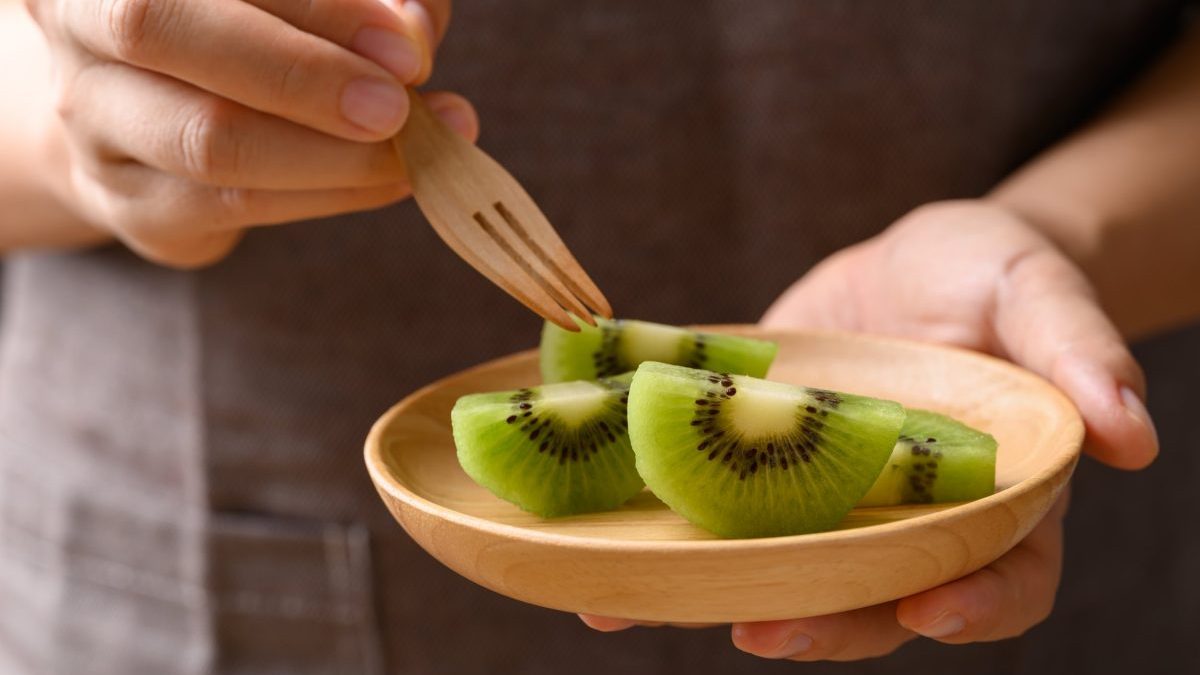It’s a nutritional powerhouse, good for gut health, inflammation and sleep – and it’s best eaten whole, like an apple
The Chinese Gooseberry, better known as kiwifruit or kiwi, is a berry native to China that spread to New Zealand in the 1900s – hence the name.
They come in two broad varieties: green kiwis, which have bright green flesh, fuzzy brown skin, and a sweet, slightly tangy flavour; and golden kiwis, which have a smoother, bronze skin, yellow flesh, and sweeter flavour.
They can either be eaten whole like an apple or by scooping out the flesh within, and have become the subject of several dietary studies in recent years.
Their nutritional content, ability to protect against disease, and even curative properties for digestive issues have elevated the berry to a natural remedy that some doctors even prescribe them. Here’s why:
It could help you sleep better
Kiwi fruit contains serotonin, which the brain needs to make melatonin, the sleep hormone. In a 2023 study by Northumbria University on a group of athletes, eating two kiwis one hour before bed was shown to result in better total sleep time and less disturbed sleep, along with improved recovery after exercise. Team GB’s experts are certainly convinced – in the Paris Olympics, athletes were encouraged to eat kiwi to ensure good rest at night.
It’s one of the best anti-inflammatory fruits
Kiwis are rich in the natural compounds that have antioxidant and anti-inflammatory effects, and some research suggests that kiwis have a more powerful antioxidant effect than other fruits like grapefruits.
Polyphenols, the protective compounds found in plants, are also present in kiwis, which can reduce inflammation throughout the body. Another important group is carotenoids – the naturally occurring pigments found in plants that are responsible for bright yellows, reds, and oranges. The lutein, zeaxanthin, and beta carotene in the berry are hugely nutritionally beneficial, with studies finding diets high in carotenoids have potential protective effects, including lowering levels of LDL (aka ‘bad’) cholesterol.
For immunity, it can’t be beaten
Without adequate vitamin C, our immune system and ability to heal from wounds are negatively impacted, making it an essential nutrient. But according to research from Ulster University, one in four people across the UK are not getting their recommended Vitamin C intake.
A single kiwi contains 80 percent or more of an adult’s daily vitamin C requirement, with studies finding that one kiwi a day was enough for 15 men with low vitamin C to reach “healthy” levels. Also, the vitamin C available in kiwis was found by one review to be more absorbable than other fruits, making kiwis more effective and rich in vitamin C than other sources (including supplements).
Kiwis also contain vitamin E, vitamin K, folate, copper, potassium, and magnesium, says registered dietitian Emma Shafqat, who recommends eating one once per day. “They’re easy to add to breakfast (in yoghurt or porridge), lunchboxes, smoothies, or eaten as a simple snack.”
She singles out vitamin K (“which is important for blood clotting and bone health”), potassium (“which helps regulate blood pressure”), and folate (“which is especially important during pregnancy”) as specifically beneficial.
It’s great for the gut, especially if you eat the skin
Fibre is essential for maintaining a healthy digestive system, but data shows that 96 per cent of us aren’t eating enough. One kiwifruit contains between two and three grams of both soluble and insoluble fibre, which amounts to up to 10 per cent – more if you eat the peel too – of your daily recommended intake.
Alongside figs, papaya, pineapple, and mango, kiwi is one of the few foods that contains actinidin, the enzyme that helps to break proteins down (it’s used commercially as a meat tenderiser), making it particularly beneficial for aiding digestion.
“Kiwi fruit is an evidence-based treatment option for the treatment of chronic constipation, with a dose of two kiwi fruit per day,” explains Dr Sam Gannick, consultant gastroenterologist. “Different studies have shown that kiwi fruit can be effective for the management of constipation and abdominal discomfort in irritable bowel syndrome.” He adds that kiwi fruit may work by increasing the amount of water in the digestive system and increasing the volume of material in the bowel.
It may lower blood pressure
Kiwis have been shown to potentially help reduce various heart risk factors, including lowering blood pressure and reducing total cholesterol levels while boosting the “good” HDL cholesterol. One review found that a diet high in the nutrients found in kiwis was associated with a lower risk of heart disease, total cancer, and death from all causes.
There is even some research suggesting the consumption of kiwis could potentially decrease your risk of developing colorectal cancer. And by consuming high levels of antioxidants, kiwis help to reduce overall health risk by reducing levels of inflammation.
